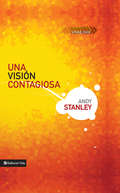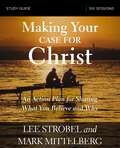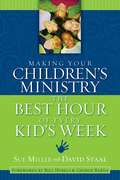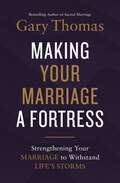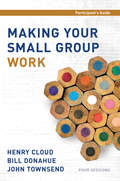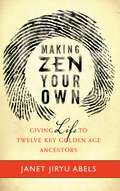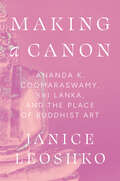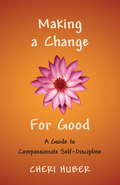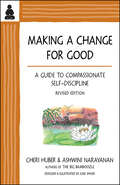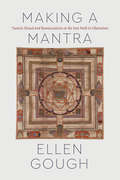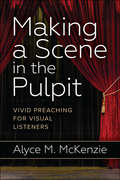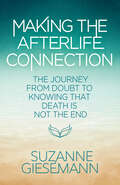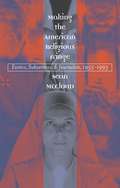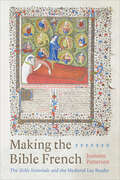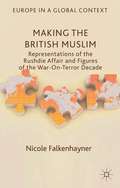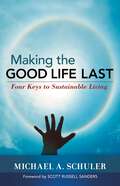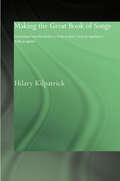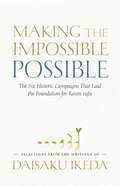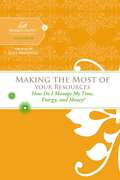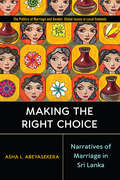- Table View
- List View
Making Vision Stick
by Andy StanleyA vision. You as a leader may have it, but has your organization caught it? If a leader's vision is all about what could be and what should be, why are you buried under what is?
Making Vision Stick (Leadership Library)
by Andy StanleyThere are lots of books about discovering or developing a vision for your organization, but this one is about making that vision endure the corrosion of time and complexity--how to make your vision stick.Influential author and pastor Andy Stanley reveals the reasons why leaders' visions often falter, and he delivers 5 in-depth strategies so that you can dodge the pitfalls:How to state your vision simply.How to cast your vision convincingly.How to repeat your vision regularly.How to celebrate your vision systematically.How to embrace your vision personally.Many of us have good ideas, even great ones. The difficult part is putting them into practice and keeping that vision clear and visible to your organization--whether that's a business or a church--when there are so many things in the day-to-day living of that vision that can distract from it.Making Vision Stick offers valuable, practical tips and case studies. This is a book you'll want to highlight and dog-ear and pass around as you learn how to propel your organization toward the vision God has granted you.Vision is about what could be and should be, but life is about right this minute. The test of a true leader is in keeping that vision on track, day in and day out.
Making Wise the Simple: The Torah in Christian Faith and Practice
by Johanna W. H. van Wijk-BosThis book points out how God's care for and engagement with the whole world in the Torah set the tone for the entire biblical story. <p><p> The book pays special attention to how our treatment of strangers lies at the heart of the Torah's teaching. Without attempting a purely Jewish reading of the Torah, the author reclaims the Torah as a vibrant word for the Christian community in covenant with God. <p><p> Written in a personal style conversant with current scholarship but sprinkled with anecdotes, this book is for everyone who has a hunger and enthusiasm for what the biblical text may convey, the courage to ask disturbing questions of the text, and an openness to old words that may bring forth new things, perhaps even making one wise.
Making Wise the Simple: The Torah in Christian Faith and Practice
by Johanna W. van Wijk-BosToo long restricted to children's storybooks and cinematic extravaganzas, the Torah -- comprising the first five books of the Bible -- is an underappreciated mother lode of divine instruction, vitally important for Christians and the church. Convinced that both those who take the Torah too literally and those who neglect it are guilty of a naïve simplicity, Johanna van Wijk-Bos presents guidelines to help ordinary Christians recover this treasure in their faith and practice. Having lived in the Netherlands during the Nazi occupation, van Wijk-Bos recognizes that after the attempted annihilation of the Jews from Christian Europe, it cannot be business as usual for Christianity. In light of the Holocaust, Christians must commit themselves to the restoration of just relations between Christians and Jews. This commitment to address all that fractures human relations undergirds van Wijk-Bos's call for Christians to reengage the Torah.Making Wise the Simple points out how God's care for and engagement with the whole world in the Torah set the tone for the entire biblical story. The book pays special attention to how our treatment of strangers lies at the heart of the Torah's teaching. Without attempting a purely Jewish reading of the Torah, van Wijk-Bos reclaims the Torah as a vibrant word for the Christian community in covenant with God. Written in a personal style conversant with current scholarship but sprinkled with anecdotes, this book is for everyone who has a hunger and enthusiasm for what the biblical text may convey, the courage to ask disturbing questions of the text, and an openness to old words that may bring forth new things, perhaps even making one wise.
Making Your Case for Christ Bible Study Guide: An Action Plan for Sharing What you Believe and Why
by Lee Strobel Mark MittelbergIn his bestselling book The Case for Christ, Lee Strobel retraced his spiritual journey from atheism to faith by showing how the evidence he obtained from experts in the field of history, archaeology, and ancient manuscripts led him to the verdict that Jesus truly was the Son of God.Now, in this six-week training course, Lee and coauthor Mark Mittelberg will equip you with practical tools to equip you articulate this same message to your unsaved friends and present evidence that backs up Jesus' claims and credentials.As you go through the course, you will discover how to:Help your unsaved friends and family members open up to consider the case for ChristDescribe your own personal journey with Christ and how it has impacted youShare with confidence about the biblical record of Christ—that Jesus was realPresent the evidence for the resurrection of Christ—that Jesus died and was raised to lifeExplain the central message of Christ in an authentic and compelling wayHelp your unsaved friends and family members respond to the truth of JesusSessions include:Helping Friends Consider the Case for ChristDescribing Your Own Journey with ChristBacking Up the Biblical Record of ChristPresenting Evidence for the Resurrection of ChristExplaining the Central Message of ChristEncouraging Friends to Follow ChristDesigned for use with Making Your Case for Christ Video Study (9780310095156), sold separately.
Making Your Children's Ministry The Best Hour Of Every Kid's Week
by Sue Miller David StaalPromiseland is Willow Creek's highly successful children's ministry. Using examples from Promiseland and churches of all sizes around the country, this book provides stepbystep guidance and creative application exercises to help churches develop a thriving children's ministry-one that strives to be the best hour of every kid's week. Included are Scripturebased principles and practical resources for church staff members and volunteers who agree with the critical role children's ministry plays in a local church. Making Your Children's Ministry the Best Hour of Every Kid's Week, based on twentyeight years of experience at Willow Creek, explains four ministry foundations: Mission, Vision, Values, and Strategy. Content includes: Detailed answers to questions facing every children's ministry: - What does Jesus expect from children's ministry? - How can we evangelize lost kids and disciple saved kids at the same time, and should we? - How do we engage kids so they don't become bored? - How do we get better at recruiting and leading volunteers? - How can our ministry be a safe place for children? - Six specific ministry values that address the needs of today's children - Practical first steps for ministries that want to get serious about change - Clear indicators of success in children's ministry
Making Your Marriage a Fortress: Strengthening Your Marriage to Withstand Life's Storms
by Gary ThomasThe wisdom and insight every couple needs to keep your marriage together when the trials of life threaten to rip it apart and how you can fortify your marriage ahead of time. Every marriage will face disaster. Illness or cancer. Job loss or financial burdens. Addiction. Anxiety. Infidelity. Loss of faith. It's not a question of if your marriage will face trials. It's a question of when. Whether you've been married for five years or fifty, your marriage will either become part of the problem or part of the solution, and it's within your power to ensure your marriage is prepared for those seasons, is a place of refuge and safety throughout those seasons, and can recover well after those seasons. In Making Your Marriage a Fortress, Gary Thomas, bestselling author of Sacred Marriage, guides you and your spouse in building a marriage that can withstand any storm or difficult season. In these pages, you will . . .Discover helpful and practical principles to protect your marriage from any struggleLearn to detect the warning signs of trouble and how to act on themUnderstand how the state of your marriage is magnified during a crisis and how to improve itBe encouraged through stories from Gary's marriage, as well as others, that you and your spouse are not aloneGain spiritual insight about God's view of marriage and how to live it out in all circumstances--for better or worse, for richer or poorer, in sickness and health, till death do you part Every marriage will face setbacks and seasons of disappointment, but this book will help you keep your marriage strong before and after a setback happens.
Making Your Small Group Work Participant's Guide
by Henry Cloud Bill DonahueWhether you’re a new or seasoned group leader, or whether your group is well-established or just getting started, the Making Your Small Group Work study will lead you and your group together to a remarkable new closeness and effectiveness. Designed to foster healthy group interaction and facilitate maximum growth, this innovative approach equips both group leaders and members with essential skills and values for creating and sustaining truly life-changing small groups. Designed for use with the video.
Making Zen Your Own
by Janet Jiryu AbelsIn this book, Janet Jiryu Abels traces the life stories of twelve Chinese Zen masters who, together, shaped what was to become known as Zen's Golden Age. She presents their biographies, describes their teachings, and shows how their lives and teachings can inspire those who practice Zen today. The book is a presentation of ancient Zen insight vividly relevant for the twenty-first century, addressing both the needs of both new and longtime Zen practitioners. Its singular distinction is in bringing Zen history, ancestral teachings, and present-day application of those teachings into one work. Although the book is based on scholarly sources and historical records, Abels stresses the humanity of these Zen ancestors, showing that they were not formed from a generic mold but were individuals with quirks, senses of humor, heartfelt enlightenment experiences, varied ways of living, and unique ways of expressing Zen. She tells their stories in a lively, accessible manner, shedding light on their paradoxical teachings with clarity and simplicity. She also shows that they all faced the same challenges that Zen practitioners face today. Interwoven among the stories and teachings are Abels' own insights into the dharma of Zen, as well as practical applications and encouragements that readers can bring to their individual practice of the Way. These insights are based on her more than ten years as a Zen teacher. She is the founder and co-resident teacher of Still Mind Zendo in New York City.
Making a Canon: Ananda K. Coomaraswamy, Sri Lanka, and the Place of Buddhist Art (Buddhism and Modernity)
by Janice LeoshkoThe story of how one scholar’s experiences in Sri Lanka shaped the contours of the Buddhist visual canon. An early interpreter of Buddhist art to the West, Ananda Kentish Coomaraswamy laid the foundation of what would become the South Asian visual canon, particularly through his efforts to understand how Buddhist art emerged and developed. In Making a Canon, Janice Leoshko examines how Coomaraswamy’s experience as the director of a mineralogical survey in Sri Lanka shaped his understanding of South Asian art and religion. Along the way, she reveals how Coomaraswamy’s distinctive repetition of Sri Lankan visual images in his work influenced the direction of South Asia’s canon formation and left a lasting impression on our understanding of Buddhist art.
Making a Change for Good: A Guide to Compassionate Self-Discipline
by Cheri HuberAccording to Zen teacher Cheri Huber, we are conditioned to think that if we were only a little better in some way, we would be happy: "Life isn't the way it should be and it's my fault!" But, Huber says, no amount of self-punishment will ever make us happy or bring us control over life's problems. The help we are looking for is really found in self-acceptance and kindness toward ourselves. By simply allowing ourselves to be guided by our innate intelligence and generosity, which are our authentic nature, we are able to be compassionately present to what's happening now. Compassionate self-discipline--the will to take positive steps in life--is found through nothing other than being present. When we are present and aware, we are not engaged in distracting, addictive behaviors. If we simply cultivate our ability to pay attention and focus on what is here in this moment, our experience can be authentic, awake, honest, and joyful.The book includes a guided thirty-day program of daily meditation, contemplation, and journaling.For more information on the author, Cheri Huber, visit her website at www.cherihuber.com.
Making a Change for Good: A Guide to Compassionate Self-Discipline, Revised Edition
by Cheri Huber Ashwini NarayananMaking a Change for Good will assist anyone to make a change of any kind, whatever the area— diet, fitness, stress, addictions, unskillful behaviors, anxiety, finances, spiritual practice... . Kind, compassionate encouragement for confronting personal issues head on and supportive tools for addressing the struggle are the differences in approach this book offers. Readers realize that lack clarity is the hindrance to addressing an issue, not lack of self-discipline. Rather than being caught in self-hating and self-blaming loops that veer us off course, we can learn to mentor ourselves, and this book teaches us how. The 30-day retreat at the end of the book provides a structure for practicing compassionate self-discipline.
Making a Mantra: Tantric Ritual and Renunciation on the Jain Path to Liberation (Class 200: New Studies in Religion)
by Ellen GoughJainism originated in India and shares some features with Buddhism and Hinduism, but it is a distinct tradition with its own key texts, art, rituals, beliefs, and history. One important way it has often been distinguished from Buddhism and Hinduism is through the highly contested category of Tantra: Jainism, unlike the others, does not contain a tantric path to liberation. But in Making a Mantra, historian of religions Ellen Gough refines and challenges our understanding of Tantra by looking at the development over two millennia of a Jain incantation, or mantra, that evolved from an auspicious invocation in a second-century text into a key component of mendicant initiations and meditations that continue to this day. Typically, Jainism is characterized as a celibate, ascetic path to liberation in which one destroys karma through austerities, while the tantric path to liberation is characterized as embracing the pleasures of the material world, requiring the ritual use of mantras to destroy karma. Gough, however, argues that asceticism and Tantra should not be viewed in opposition to one another. She does so by showing that Jains perform “tantric” rituals of initiation and meditation on mantras and maṇḍalas. Jainism includes kinds of tantric practices, Gough provocatively argues, because tantric practices are a logical extension of the ascetic path to liberation.
Making a Mantra: Tantric Ritual and Renunciation on the Jain Path to Liberation (Class 200: New Studies in Religion)
by Ellen GoughJainism originated in India and shares some features with Buddhism and Hinduism, but it is a distinct tradition with its own key texts, art, rituals, beliefs, and history. One important way it has often been distinguished from Buddhism and Hinduism is through the highly contested category of Tantra: Jainism, unlike the others, does not contain a tantric path to liberation. But in Making a Mantra, historian of religions Ellen Gough refines and challenges our understanding of Tantra by looking at the development over two millennia of a Jain incantation, or mantra, that evolved from an auspicious invocation in a second-century text into a key component of mendicant initiations and meditations that continue to this day. Typically, Jainism is characterized as a celibate, ascetic path to liberation in which one destroys karma through austerities, while the tantric path to liberation is characterized as embracing the pleasures of the material world, requiring the ritual use of mantras to destroy karma. Gough, however, argues that asceticism and Tantra should not be viewed in opposition to one another. She does so by showing that Jains perform “tantric” rituals of initiation and meditation on mantras and maṇḍalas. Jainism includes kinds of tantric practices, Gough provocatively argues, because tantric practices are a logical extension of the ascetic path to liberation.
Making a Mantra: Tantric Ritual and Renunciation on the Jain Path to Liberation (Class 200: New Studies in Religion)
by Ellen GoughJainism originated in India and shares some features with Buddhism and Hinduism, but it is a distinct tradition with its own key texts, art, rituals, beliefs, and history. One important way it has often been distinguished from Buddhism and Hinduism is through the highly contested category of Tantra: Jainism, unlike the others, does not contain a tantric path to liberation. But in Making a Mantra, historian of religions Ellen Gough refines and challenges our understanding of Tantra by looking at the development over two millennia of a Jain incantation, or mantra, that evolved from an auspicious invocation in a second-century text into a key component of mendicant initiations and meditations that continue to this day. Typically, Jainism is characterized as a celibate, ascetic path to liberation in which one destroys karma through austerities, while the tantric path to liberation is characterized as embracing the pleasures of the material world, requiring the ritual use of mantras to destroy karma. Gough, however, argues that asceticism and Tantra should not be viewed in opposition to one another. She does so by showing that Jains perform “tantric” rituals of initiation and meditation on mantras and maṇḍalas. Jainism includes kinds of tantric practices, Gough provocatively argues, because tantric practices are a logical extension of the ascetic path to liberation.
Making a Scene in the Pulpit: Vivid Preaching For Visual Listeners
by Alyce McKenzieHow can preachers ensure that their sermons continue to engage listeners in a world defined by visual media and the short, segmented delivery of information? Alyce McKenzie harnesses the element of drama and the human fascination with scenes to offer ministers a modern means of sermon development and delivery. <P><P> McKenzie's core strategy is to invite listeners into scenes—whether from Scripture or contemporary life—and, once they are there, to point them toward the larger story of God's relationship with humankind. Creating such scenes unifies the whole process of preaching, she says, from the preacher's daily life observations to interpretation of scenes from Scripture, to sermon shaping, sequencing, and delivery. The process culminates in a specific understanding of the purpose of the sermon: to send listeners out into the scenes they'll play in their lives for the next week, equipped to act out their parts in ways that are kinder, more just, and more courageous than last week.
Making the Afterlife Connection: The Journey from Doubt to Knowing That Death Is Not the End
by Suzanne GiesemannA profound exploration of mediumship, spirituality, and the interconnectedness of all beings, with practical tools and personal stories to help readers connect with the spirit world and their own divine nature.In Making the Afterlife Connection, gifted medium Suzanne Giesemann takes readers on a journey of spiritual awakening, to a life beyond physical existence.As a former Navy Commander, Suzanne's credibility and down-to-earth style make deep spiritual concepts accessible and engaging. She offers a grounded approach that blends her military background with her spiritual insights, and in doing so, she demystifies mediumship and provides a systematic method for others to explore their own giftsMaking the Afterlife Connection is rich with compelling, true stories and practical exercises that help readers experience their own spiritual connections.By sharing her personal journey and the irrefutable evidence she has gathered, Giesemann helps readers understand that they are part of a larger, interconnected web of existence and that divine love is a powerful, healing force available to everyone.
Making the American Religious Fringe
by Sean MccloudIn an examination of religion coverage in Time, Newsweek, Life, The Saturday Evening Post, Ebony, Christianity Today, National Review, and other news and special interest magazines, Sean McCloud combines religious history and social theory to analyze how and why mass-market magazines depicted religions as "mainstream" or "fringe" in the post-World War II United States. McCloud argues that in assuming an American mainstream that was white, middle class, and religiously liberal, journalists in the largest magazines, under the guise of objective reporting, offered a spiritual apologetics for the dominant social order. McCloud analyzes articles on a wide range of religious movements from the 1950s through the early 1990s, including Pentecostalism, the Nation of Islam, California cults, the Jesus movement, South Asian gurus, and occult spirituality. He shows that, in portraying certain beliefs as "fringe," magazines evoked long-standing debates in American religious history about emotional versus rational religion, exotic versus familiar spirituality, and normal versus abnormal levels of piety. He also traces the shifting line between mainstream and fringe, showing how such boundary shifts coincided with larger changes in society, culture, and the magazine industry. McCloud's astute analysis helps us understand both broad conceptions of religion in the United States and the role of mass media in American society.
Making the Bible French: The Bible historiale and the Medieval Lay Reader
by Jeanette PattersonFrom the end of the thirteenth century to the first decades of the sixteenth century, Guyart des Moulins’s Bible historiale was the predominant French translation of the Bible. Enhancing his translation with techniques borrowed from scholastic study, vernacular preaching, and secular fiction, Guyart produced one of the most popular, most widely copied French-language texts of the later Middle Ages. Making the Bible French investigates how Guyart’s first-person authorial voice narrates translation choices in terms of anticipated reader reactions and frames the biblical text as an object of dialogue with his readers. It examines the translator’s narrative strategies to aid readers’ visualization of biblical stories, to encourage their identification with its characters, and to practice patient, self-reflexive reading. Finally, it traces how the Bible historiale manuscript tradition adapts and individualizes the Bible for each new intended reader, defying modern print-based and text-centred ideas about the Bible, canonicity, and translation.
Making the British Muslim
by Nicole FalkenhaynerTracing representations of the Rushdie affair from 1989 to 2009, this study establishes a genealogy of how British Muslims appeared on the public scene and how an imaginary and politics of this subject position developed.
Making the Good Life Last: Four Keys to Sustainable Living
by Michael SchulerSo many of us are beset by anxiety, depression, loneliness, and spiritual malaise, tense and unhappy despite our gadgets and goodies. Michael Schuler, leader of the nation’s largest Unitarian Universalist congregation, says it’s because, urged on by an aggressively materialist culture, we too often opt for short-term gratification and long-term denial. In this thoughtful and deeply honest book, he helps us find a life path that leads to treasures of perennial value: a beautiful and healthy earth home, enduring relationships, strong communities, work that contributes to the common good, and play that restores our bodies and lifts our souls. Deconstructing the assumption that consumption, stimulation, and constant motion comprise the good life, Schuler urges the wholesale embrace of sustainability as both an operational principle and a life-sustaining core value. His book presents sustainability as a coherent frame of reference that can ground us spiritually, heal us internally, and deepen our relationships. Schuler identifies four behavioral principles for living sustainably—Pay Attention, Stay Put, Exercise Patience, and Practice Prudence—and shows how to apply them in our daily lives. He uses stories from his own life to illuminate the rewards and challenges of sustainable living and shares insights from environmentalists, social commentators, writers, poets, businesspeople, and spiritual leaders. Sustainability means more than mere survival—for individuals, just as for natural and social systems, it’s the key to thriving rather than burning out. For those seeking a more profoundly satisfying way of life, Schuler’s heartfelt explorations offer a counter intuitive answer: the sustainable life is the good life.
Making the Great Book of Songs: Compilation and the Author's Craft in Abû I-Faraj al-Isbahânî's Kitâb al-aghânî (Routledge Studies in Middle Eastern Literatures)
by Hilary KilpatrickThis is the first systematic literary study of one of the masterpieces of classical Arabic literature, the fourth/tenth century Kitâb al-aghânî (The Book of Songs) by Abû I-Faraj al-Isbahânî. Until now the twenty-four volume Book of Songs has been regarded as a rather chaotic but priceless mine of information about classical Arabic music, literature and culture. This book approaches it as a work of literature in its own right, with its own internal logic and coherence. The study also consistently integrates the musical component into the analysis and proposes a reading of the work in which individual anecdotes and poems are related to the wider context, enhancing their meaning.
Making the Impossible Possible: The Six Historic Campaigns That Laid the Foundation for Kosen-rufu
by Daisaku IkedaFew believed it could happen. Most dismissed it as fantasy. But when Josei Toda in 1951 revealed his grand vision to grow the Soka Gakkai in Japan from a membership of a mere three thousand to a membership 750,000 households strong, one young disciple vowed to make it happen. Daisaku Ikeda soon took the lead, and over the course of six years and six major campaigns he blazed the trail for the unprecedented growth of a people's movement for peace. He cared for and inspired each person he met along the way, and soon thousands united with him and his mentor, helping person after person overcome their struggles and find true happiness. These are not only inspiring stories from the past but lay out a formula so that we, in our present and future, can turn our impossibilities into possibilities.
Making the Most of Your Resources: How Do I Manage My Time, Energy, and Money? (Women of Faith Study Guide Series)
by Women Of FaithGrow in intimacy with God through in-depth Bible study. Women of Faith, renowned for their unique combination of personality and truth, offer fresh new messages in four new topical study guides in the popular Women of Faith Study Guide Series.Each study guide, teeming with insights and quotes from the conference speakers provides twelve weeks of Bible study and a leader's guide for small groups.Making the Most of Your Resources: How Do I Manage My Time, Energy, and Money? uses Scripture to address issues such as:How to weigh your resourcesHow to leverage the finite hours in the day to your advantageFinding energy and rest in the LordLearning to trust God to provide (financially)Knowing that we can't do it all ourselves, we need to lean on the Lord
Making the Right Choice: Narratives of Marriage in Sri Lanka (Politics of Marriage and Gender: Global Issues in Local Contexts)
by Asha L. AbeyasekeraMaking the Right Choice unravels the entangled relationship between marriage, morality, and the desire for modernity as it plays out in the context of middle-class status concerns and aspirations for upward social mobility within the Sinhala-Buddhist community in urban Sri Lanka. By focusing on individual life-histories spanning three generations, the book illuminates how narratives about a gendered self and narratives about modernity are mutually constituted and intrinsically tied to notions of agency. The book uncovers how "becoming modern" in urban Sri Lanka, rather than causing inter-generational conflict, is a collective aspiration realized through the efforts of bringing up educated and independent women capable of making "right" choices. The consequence of this collective investment is a feminist conundrum: agency does not denote the right to choose, but the duty to make the "right" choice; hence agency is experienced not as a sense of "freedom," but rather as a burden of responsibility.
